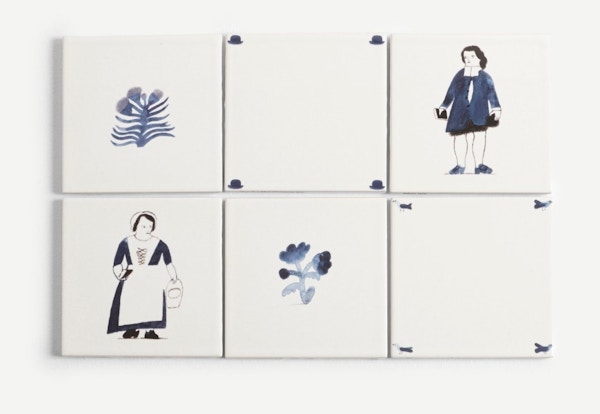Daniel Carpenter, who led the HCA’s study, says: ‘These crafts are a part of our heritage – not just the objects they produce but the skills themselves. Like many traditional practices, they are often too subtle to be revived from written sources or documentary films. They have to be kept alive through continual practice and one-to-one transmission… often, when a craft has gone, it’s lost forever.’
Here, we celebrate the sites keeping traditional crafts alive.
The New Craftsmen

Based in Mayfair and established in 2012, The New Craftsmen is a collective of makers who use traditional methods in a modern way. This thoroughly contemporary posse of skilled artisans has a whopping 65k followers on Instagram. Meanwhile, its wares are all made in time-honoured ways. They say: ‘The New Craftsmen curates, commissions and sells unique contemporary objects that are rooted in craftsmanship and narrative. Spanning furniture, lighting, textiles, gifts, ceramics and artworks, our range is made by a growing network of makers from across the British Isles.’ We’d like to find a set of Laura Carlin’s Traditional London Life Tiles under the Christmas tree this year.
Brickett Davda

A perusal of this website makes you feel as though all is well in the world. Jo Davda studied fine art before starting to experiment with English clay at her kitchen table. Pretty soon, this wonderful, handmade range of ceramics was born. Everything about her tableware collection is soothing for the soul. Best of all is the colour palette. Brickett Davda says: ‘The colours reflect the grey skies and the sea of the British coast and countryside, pigments that are calm and serene.’ Every house needs a Large Deep Bowl, preferably in the Heather colourway.
Blenheim Forge

Every one of these chef-quality knives is handmade in Peckham. Based in a railway arch with a long history of metalwork artistry, Blenheim Forge is the steel workshop of super-cool bladesmiths, Jon Warshawsky, James Ross-Harris and Richard Warner. Of the pattern-welded steel that Blenheim uses to create its supremely sharp knives, Warshawsky says: ‘It’s something Japanese bladesmiths have done for centuries, but they’ve never written a book explaining exactly what to do. If you want to learn it, you either have to go to Japan or buy a lot of steel and try it out yourself – we did the latter.’ Their knives, which take days to make, are objects of true beauty. We are saving up for a Santoku Knife.
Annemarie O’Sullivan

Before she was a basket maker, Annemarie O’Sullivan was a primary-school teacher, a wife and a mother. Feeling the need to work with her hands, she took a one-day basket-weaving course and became hooked. She told House & Garden: ‘After making my first basket, I dreamt of the smooth, fluid strokes of the willow.’ She went on to complete intensive training over several years and then set up a flourishing basketry business. Her workshop is a studio in her Sussex garden, where she cultivates 20 varieties of willow. Head to her site to buy her exquisite baskets and to see pictures of her exhibitions and high-profile projects. Her Ulster Potato Basket is deeply covetable.
Compton Marbling

Like many of the finest ideas, Compton Marbling began in a garden shed in the 1970s. Inspired by the marbling she’d seen in the library at Stanford University in California, founder Solveig Stone honed her craft with oil paint and a homemade marbling tank. When she outgrew the shed, she moved her studio to some beautifully restored farm buildings on the Wiltshire/Dorset border. It is from there that Compton Marbling’s array of exquisite handmade papers and homewares are produced today. We find their Wastepaper Baskets particularly hard to resist.
Chris Dodson Thatching Services

Using water reed, combed wheat reed and long straw, Chris Dodson’s family have been providing expert thatching services for four generations. The family company is based in Cambridgeshire and operates throughout Rutland, Lincolnshire, Northamptonshire, Bedfordshire and Hertfordshire. Passionate about passing on his knowledge to future generations, Dodson is a proud member of the East Midlands Master Thatchers Association and has won several awards from the Campaign for the Protection of Rural England (CPRE) and the National Society of Master Thatchers. The site’s picture gallery is glorious.
Pinxton & Co

The Pinxton factory was founded in 1796 and, in its heyday, employed some of the most sought-after craftsmen in Europe. Recently relaunched with an extremely elegant website, Pinxton & Co still follows in this tradition to produce exquisite hooks and ironmongery. More designs are coming soon, but we adore the Elephant Hook In Brass. Originally designed in 1908 by ironfounders John Harper & Co, this hook has been remodelled for today by Pinxton, using the talents of a highly skilled jeweller.
Another Country

Since 2010, Another Country has designed and made contemporary wooden furniture and home accessories. Making use of traditional techniques and modern technology, these pieces are created with sustainability in mind. Another Country’s inspiration comes from the unpretentious Shaker, Scandinavian and Japanese styles of woodwork. The firm says: ‘We endeavour to re-interpret the spirit and functionality of these honest forms of furniture for a modern customer.’ We’d like several Hardy Chairs in Oak to hand down to our descendants.
If you liked reading this, then you might like:
The Room Service
Natalie Melton
Cambridge Imprint
By Becky Ladenburg
November 2019

